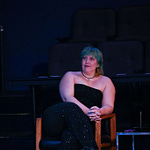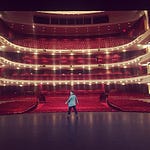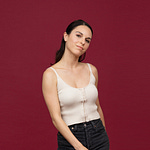Everyone please welcome my friend and fellow Wichita State alumni Maddie Mason, to A Broadway Body: Continued Conversations! Maddie is a dance teacher and choreographer based in Oklahoma City, OK. We’d attended university at the same time and danced in many a class together, and I was thrilled to have a conversation with her!
The way Maddie speaks about showing up to the dance spaces she leads is of the utmost importance if we want to shift outdated narratives about dancers’ bodies. Not only is her lens as a dance teacher and choreographer so needed in today’s dance world, she’s also a mom. Hearing her talk about how she shows up around her kids and ensures to not talk down about other people’s bodies in front of them gives me hope for our future generations to come. Maddie is a gem of a person, and I cannot wait for you to hear our discussion around body image and dance!
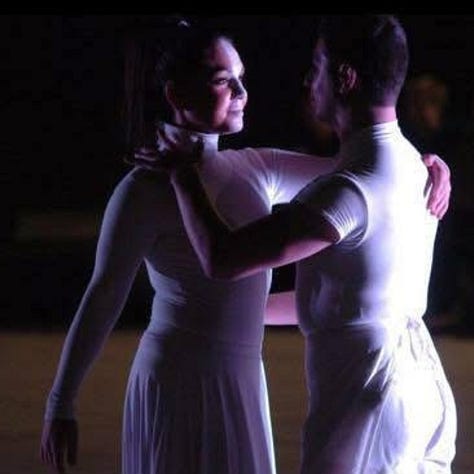

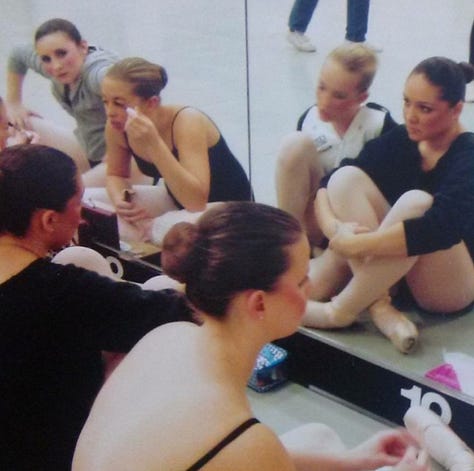
“ Like you said, in “Cabaret,” the ensemble member was wearing the exact same costume, and they probably created a costume for her, the exact same design as everybody else. Instead of, I don't know how many times it was, “Here's the box. Here's the costumes. Find one that you fit in.” And there was a time in college where I was like, “I don't fit into any of these, so either I have to find a different costume, or I'm not in this piece, or I have to work to fit into a costume.” It’s stuff like that that is treating people with humility. And as an artist, I don't feel like we grew up learning that or feeling like we deserved that. And now that we're grownups, we can change that and make sure we're in spaces where that is not happening, where that's not the culture.”
- Maddie Mason
Megan Gill: Hi, Maddie! Thank you for being with me here today for this conversation. I'm so excited to talk.
Maddie Mason: Thank you for having me, Megan.
Megan Gill: Of course! Do you wanna start by just introducing yourself and sharing a little bit about the work that you do in the world today?
Maddie Mason: Yeah, so my name is Maddie Mason. I am 35 years old. I am originally from Wichita, Kansas. I graduated from college with a BFA in Dance Performance. From there, I worked at the college level, worked with kids in studios. I've done choreography workshops. We've done workshops! But in 2019, my husband and I moved to Vegas, and I taught dance out there at studios until COVID, and then everything changed. But now we live in Oklahoma City. We love it. We're getting settled, and yeah, I'm still teaching dance and kind of freelancing here and there.
Megan Gill: I love that. We love the freelancer life. And we went to school together during the same time. We were both in adjacent programs at our same college. That is where we met in our origin story. So we have a lot of the same community and come from a similar collegiate educational background too.
Maddie Mason: Yes. Yeah, I think we both – I think it was, I don't know, modern or jazz that we were in together, but we had a lot of mutual friends, and so it was I knew you, you knew me, and then we got to dance together.
Megan Gill: Yeah, and I was always that music theater kid that was taking random dance classes that I didn't need to take. Like I think I would just show up and not even be enrolled!
Maddie Mason: You were! You would take everything. You'd be like, okay, hip hop this semester. I'm pretty sure we took tap a couple times together. There were a lot of tap memories there.
Megan Gill: Probably.
Maddie Mason: Oh, yeah. Good times. It feels like a lifetime. It's just wild.
Megan Gill: Good times, it really does. It’s pretty wild.
Maddie Mason: We're all grown up now. All the lessons we’ve learned.
Megan Gill: It's crazy. Okay, so you grew up in the dance world. Have you just been dancing your whole entire life? I know you mentioned that your mom and your aunt were both dancers in the eighties, so I imagine that you just came out of the womb in dance classes.
Maddie Mason: Honestly, yeah. My mom taught with me. My parents opened up the studio in, I think it was ‘86 or ‘87, and my mom taught pregnant with me up until the day before I was born. So I've been there the whole time and it's so cute because I got to do that with my daughter too. So I got to teach with her and my belly up until the day before she was born. So it's kind of a generational thing. But yeah, my daycare, nursery was in the studio in the back room, and it's kind of just I really had no choice. It was just what we did, you know? My mom wasn't gonna pay a babysitter. She was gonna stick me in ballet class.
And so, I've never known a world without dance, which gives me, I think, an interesting perspective. Instead of people who find their passion for it, I think mine grew, for sure, and there have been so many ups and downs that it's just been an interesting ride from the very beginning.
Megan Gill: Yeah, this thing that you just came into and this way of life that you didn't know any differently. Did it take you time to – did you kind of resist it at points or were there times where you were like, “I don't love this”? Is that what you were talking about?
Maddie Mason: Oh yeah. I think in elementary school was the first time it was all my friends were joining Girl Scouts, and that seemed really fun. But my mom owned a dance studio, so it was like, “Well, after school we pick you up when we go to the studio.”
So I felt like I did miss out on normal kids activities. So I did, in elementary school, see a lot of friends doing different stuff that I did want to maybe get into. But dance was always the main focus, and I don't think it was until maybe eighth grade that it clicked for me and I was like, “Oh, I love this. I wanna do this.” And I've always wanted to be a teacher from the very beginning. I mean, every little girl dreams of being a dancer. And in middle school it was like, “Oh, I wanna be a Britney Spears backup dancer.” And then, you know, it was the first time I think I had gotten a scholarship for the next year, and I was like, “Oh my gosh.” I just idolized those teachers and was like I want to make people feel like how they made me feel.
So I think from the beginning and having my mom as a teacher, seeing that side of things just kind of I knew that was the path I wanted to take, but, no, as a kid, it's confusing, and you're like, “How am I gonna get here?”
Megan Gill: Totally. I love that. I'm curious, as someone, obviously when you're a dancer or a dance teacher, you spend a lot of time in front of the mirror, right? So obviously growing up in dance – I also grew up in the dance world, you just learn that looking at yourself in the mirror is a way of life also.
Maddie Mason: Yeah.
Megan Gill: That is how you self-correct. That's how you check your form. It’s such a tool, but I also feel like it this thing that can lead some people to a very dark place when it comes to their body image. I'm curious how growing up in front of the mirror in dance impacted your body image from a young age and how growing up in that space affected you as far as how you saw yourself and related to your body.
Maddie Mason: Yeah, so I always, as a child, never really gave it a thought. My sister has always been bigger than I am. And so, she got a lot of the brunt of when it came to, “Oh, here's what you should eat. Here's what you shouldn't eat.” My mom came from the eighties high-cut leotard Spandex days where it was like we have a cigarette and a Diet Coke for lunch, and that's it.
And so, we grew up – you know, my mom always with the fad diets, at a young age, hearing about all that and looking at how my mom treated that whole world and her own body. I saw it. I think my sister experienced a lot more of that trauma. A lot of it was aimed at her a little more because I had a higher metabolism than she did. We ate the same things, we had the same diet, the same routine. We were just different. And that was hard for my mom too. It was hard for her to have a kid who wasn't just naturally thin from the get go.
And so, my mom also had to work kind of at the body she has in a different way. So she was like, “I did this. When I gained weight as a kid, this is what I did to fix it, and you can fix it too. You just have to not eat this or this.”
So all of that was aimed at my sister, but I was definitely observing it and listening and taking it in. It didn't really hit me, I guess, until I graduated high school because I had danced my whole life growing up. I was always active, always dancing constantly. I didn't give a second thought to my nutrition, really. When I got to high school age, I mean, I could feed myself.
So I gained weight right after high school. I mean, lots of people do. And it was like that summer, right after high school, I'd had a little freedom. I didn't have to dance that summer. It was the first time I think I'd been given a break ever.
Megan Gill: Wow.
Maddie Mason: So I ate, I slept, I drank, and I gained a lot of weight. And for me it was, “Oh no.” I remember it being such a terrifying feeling because growing up, this is the worst thing that could happen to you. How dare you be comfortable and relax. And it was always, “You gotta be on top of it. You gotta be strict.”
So that’s my background there, but then again, I remember hanging out with these two boys that I went to school with and they were saying, I don't know. They had mentioned something about my weight, and I kind of brushed it off and it was whatever. So I go to ballet school right after high school. This is my summer break, and then I enrolled in a private college, and it was a strict ballet program. We only had 30 minutes to tap, 30 minutes of jazz a week. And I don't know what I was thinking because it was totally not for me, but it was a strict ballet program, so I immediately lost all the weight I had gained over the summer, not in a healthy way because my instructor was going by the bar and patting my belly. But I remember those same boys seeing me and going, “Oh, thank god you lost that weight because you were kind of getting big there for a second, but you lost it all, so…” And I was like, “Oh, okay.”
So I think that was the first time – you know, the ballet teacher, the strict old-school ballet teacher combined with getting comments from boys from my school, it was just like, “Oh, okay. So people have noticed that I've gained weight, they are talking about me, and my worth is definitely based on how I look and what weight I'm at.” And so, that kind of started a lot of things, a lot of different emotions, a lot of feelings. I felt like I was in control of myself for the first time. I was 18. I was in college, but I had no idea what I was doing. I couldn't handle my emotions. I didn't know what to eat. All I knew was to not eat. If you wanna lose weight, just don't eat. So confusing.
Megan Gill: Which is like the the worst thing you could possibly do for your body when you are moving as much as you were.
Maddie Mason: Oh, yeah. And not only at that point was I getting it from my mom, but my teachers. I mean, my mom was friends with the teachers, so it was just that old-school mentality of, I mean, you know, “Eat an apple a day, and you'll be fine,” or like grab a grape and an almond, and keep going,” which is insane, absolutely insane.
Megan Gill: Yeah. It's insane. I fully agree.
Maddie Mason: Which, I feel like the last ten years we've kind of gotten away from that. I've seen a shift for sure, but I said to a coworker recently because her daughter was in a ballet class, and the teacher had made a comment, and I had kind of known what teacher it was, and she's an older woman, an incredible teacher, very world renowned. But it's that old-school mentality that that older generation, I hope that we're phasing out of, no offense to them because we've learned everything from that generation, but also let's take all that and do better.
Megan Gill: Yeah, absolutely agree with you on that. There is a different way, I know that there's the saying, “They're set in their ways. The older generations are never gonna change.” Like with my parents, I've accepted they're not gonna change unless they want to change. So it's this fine line of how do we start trying to shift that narrative for the older generations, with the older generations, because they are still teaching and they are still in educational spaces. And I know for us at Wichita State, there were a lot of older professors, and the age gap is so vast. So how do we bridge this gap and try to help them see that there is a different way and that the industry is changing and shifting, ooh, because it is so harmful.
Maddie Mason: It is, and it's shifting so fast too. I mean, I graduated in ‘16, and I remember we didn't come out of college with a reel, with any work that we could actually show. It all belonged to the college, which I understand copyrights and all of that. But we weren't prepared, I don't think, to come out and – it's kind of how I felt as an 18-year-old going out into the world. They prepare you for a world that really doesn't exist anymore.
Megan Gill: Yeah. Oh gosh, that is so true. And I can very much relate from like the music theater standpoint as well. So it's not only like shifting these outdated narratives about bodies and how to care for your body as a mover, as a dancer, as a performer, but also how are we showing up in this ever-changing industry as well. That’s such a good point.
Maddie Mason: It's mind-boggling sometimes. And COVID changed everything. We were all online all of a sudden, and that could do a number of things to you mentally. It could motivate you, or it could hinder you. It’s kind of that whole new world thing. And now it's changed even more, which is good and bad. It’s good because I follow dance accounts for girls who are all shapes and sizes, and it really exposes us to everybody really can dance. You don't have to be stick thin. No matter your ability or size or shape or anything, everybody can move, and everybody deserves that space, and it's nice that social media showcases that for sure. But it depends on your algorithm. Sometimes it's the opposite. We’ve gotta get the algorithm right. We’ve gotta get the motivation, the positive stuff, because it has turned into – there is that other side where it's like, “Oh gosh.” You can look at these Russian three-year-olds who are like en pointe or lifting their leg up to their head, and you can compare yourself all day long, but it's a slippery slope.
Megan Gill: Totally. But it is really cool to see how the world of social media has opened our eyes a little bit to these different ways of just real life being represented in the spaces like dance, the dance world, and on Broadway, in the acting world, just all of these different things. It's like what are we doing here? We're representing real life and through our performance.
And specifically with dance, in an industry where you are, more than anything, taught to be thin and taught that thin is good, it's so important to support the narrative-change that anybody can dance and anybody should dance, and there should be space for anybody with a body to be able to dance.
Maddie Mason: Anybody with a body! Yeah, I mean, you think about movies, if there's an old woman in a movie, it's usually played by an old woman. It's not always a young person dressed as an old person. You see movers in a commercial, if somebody's walking down the street and they start dancing, you're gonna spot a ballet dancer right away. But normal bodies can move, and normal bodies represent the majority.
Megan Gill: Right, and normal bodies can also do ballet.
Maddie Mason: Yes, yes, yes, yes.
Megan Gill: Which is also just maybe the worst – not worst, but I think the hardest place where like shifting the lens exist or the hardest place to kind of change the way we –
Maddie Mason: Oh, my gosh, I find myself still catching myself. I mean, I just said “Ballet Body” and every body's a ballet body, but your mind goes to it out of just habit and from knowing what you know and growing up in it. But I hope that in the future, I say “Ballet Body” and everybody just thinks of everybody.
Megan Gill: Yeah. Wow, that's such a good point and interesting to hear you say about “Ballet Body” because obviously, as a dancer, I understand what you mean, and that's kind of where this phrase, a “Broadway Body” came from too. It's the same thing. It’s same same but different. It's like a “Ballet Body,” a “Broadway Body.” These industries that traditionally represent a certain type of body type being the one that's front and center and featured in the performances. And yeah, yeah, it's so great that we are making strides in our slow but sure ways of moving away from that
And hopefully – as someone who is leading these spaces for these younger generations that are in dance, I am curious to hear the ways in which you show up to those spaces, and if there are any things that you do differently or just the way that you lead your classes and lead your workshops and the way that you show up to support these young dancers, to be a voice, to shift that narrative and to teach them the opposite of kind of what you were taught.
Maddie Mason: Yeah, I think I became aware of it when I was in middle school/high school, and I knew I wanted to be a teacher, and one of the main motivations for me was, “Okay, I've had some really bad teachers, and I've had teachers who didn't make me feel welcome or didn't make everybody feel welcome or didn't make you feel good after their class or after the week. I think I so desperately wanted a teacher to motivate and to love me no matter what and to really say, “What do you want out of this? And let's work on it together.” So I was aware of that as a young person.
As I got older, towards the end of college when I really started teaching, at that point, I'd had the education. We'd taken anatomy. We'd taken dance kinesiology. So making sure that I approached everything from just an anatomical standpoint. So it's, “Your bones are here. Your muscles are here. This is how your body works. Let's talk about that and not about your metabolism or about how high your leg is right now, naturally. Let's work on it together. Let's find a path,” and work with what you have.
Growing up, a lot of the focus was just, “Where is this line? How high can your leg get?” But I don't think I was ever using the correct muscles or using the right intention. And so, getting into teaching, I just definitely wanted to make sure that we were talking about our bodies from a factual, scientific standpoint and not somebody's opinion on what it should look like. So if we're doing a move, this is what it should feel like in these muscles, not anything else. Just stick to the facts, and I don't ever comment on a student's body. I don't ever. Even people in general, I don't ever comment on a weight gain or a weight loss because you just don't know. You really just don't know. Just say, “You look amazing,” or just, I don't know.
My mom, bless her soul. I love her to death, but it's the first thing that is commented on, and it's just, oh, I don't want anybody to feel like their worth is that because I know how that feels, and it doesn't do anybody any good.
Megan Gill: Yeah, I absolutely agree with you. I have a similar story specifically when it comes to the way that boys talked about my body when I was in high school and the messaging that I received socially about my body, and it's like when you've been there and when you have experienced that firsthand, you really, really know how it feels. And even the comments – because I love my mom so much as well, and she doesn't mean any harm by it, but she's, I mean, the same way. As of course my weight fluctuated throughout my life, she make comments about it too, and it's really not good. It's really unhealthy to praise the weight loss. Not that we're deeming one more damaging than the other, but that is so, so, so damaging to the psyche of the person who has lost the weight, whether it's, what is it? What's the word? It's like they're receiving this conditioning that's like, “Yeah, I need to keep going. I need to keep doing this because this equals good.”
Maddie Mason: Oh, absolutely.
Megan Gill: “Losing weight equals good. Gaining weight equals bad.”
Maddie Mason: Mm-hmm. I'm also hyper-aware of it now that I have kids because it's just, not even saying it to them, if they hear me say anything about anybody ever, that's what they hear and that's what they think people's worth is. They hear me go, “Oh my gosh,” or talking behind people's backs or just making little comments about people's appearances. That's the stuff I grew up with. And so, you get conditioned after a certain point to think, “Okay, well that's what everybody's thinking. So I know I've gained weight, and if I heard a comment from one person, ugh, obviously it's not one person. Everybody's gotta be thinking it.” And then it can spiral from there. But just making sure that I don't pass that on to my children and or my students or anybody. Just hoping that I never make anybody feel like that ever. That's my goal. It's just dance for joy and dance because it feels good and not because you feel like you have to be something.
Megan Gill: Oh my gosh, that is a word. Drop the mic right now. Like really and truly! And especially as someone who is a mother, I just think it's so, so, so, so important that you are careful about not speaking about other people in front of them. And I do think that more and more people of our generation and of upcoming generations are of this mind and are a lot more conscious of this, in particular, of not speaking poorly about your own body in front of a younger person, whether that's your child or your student or your niece, nephew, whoever it may be. I even think, because I have a couple of young people in my life, of not being like, “Ah! You're so pretty!” Just not commenting on their appearance. Just really trying to not be like, “What a beautiful child!” It's like, okay, there are so many other things about us as human beings than just the way we look.
Maddie Mason: Yeah, absolutely.
Megan Gill: And how can I show up and do better when speaking to children or about other people in front of children? Yeah. So I just really love hearing that and I think it's so vital.
Maddie Mason: I have a funny thing, actually. This kind of goes along with my toxic family circle. My cousin, a while ago – I can't remember if it was my cousin or my aunt, but this was back in the nineties, and she was talking to somebody and talking about how she had gained a lot of weight and she doesn't feel great, she really wants to lose it. And the girl she was talking to goes, “Oh my gosh, no. What are you talking about? You're beautiful.” And she goes, “I said I was fat, not ugly.” I was like, oh my god. If that doesn't explain the whole just everything that is wrong with… I was like, oh my god. Right? Fat doesn't equal ugly, beautiful doesn't equal skinny. It's just, yeah, these correlations that people make, and it's just wild.
Megan Gill: It is wild.
Maddie Mason: I see us shifting away from it, which is amazing. But we still get it here and there. It's still there.
Megan Gill: Oh, absolutely. Because it's like we're in our thirties. This is 30 plus years of conditioning and a lot of the conditioning being that skinny equals beautiful, skinny equals good, and fat equals ugly, fat equals bad. Like that is truly like growing up in the nineties and the early two thousands. That was the message that we were receiving left and right and up and down and from our peers and from parental figures or teacher figures or whoever it may be. It was all around us. So of course it’s taking so much energy to undo that. But I'm also really proud of people like us and people from our generation for doing that work (because it is heavy-lifting work) to then be able to shift the way we think about different types of bodies for the kids that are being born in 2025. I'm so curious to just how much that this shifts in the next 20 to 30 years.
Maddie Mason: I know. It's exciting to think about. It's exciting to think about what these little babies are – oh, and I'm sure they'll grow up and be like, “Our parents' generation is whack! What is all this? They don't know anything! They're so uneducated!” They're gonna be saying the same thing we are about our parents, but hopefully not… Hopefully not!
Megan Gill: Yep. Yep, hopefully not to certain extents, you know? For sure.
Maddie Mason: I was saying the other day about reality shows. My sister was sending me clips of just some old stuff from the very beginning, like two thousands reality shows. And it's like no wonder we all kind of came out of that early two thousands in such a weird mindset going into adulthood. I mean, the cattiness and the eating disorders and just the everything. Everybody was so skinny, so skinny. And it's just wild to look back at those clips, and it was just so accepted and acceptable to say some of those things and act certain ways. It's just wild to look back on. It’s lovely to think about the future.
Megan Gill: Right. I think it was also interesting thinking about my mom. Like, it was so hush hush to be like in a bigger body and proud of it, you know?
Maddie Mason: Yeah, that was not a thing. You were always the joke or the character, the Fat Amy or the big, funny girl. It was always some shtick that came along with being in a bigger body.
Megan Gill: Right, of course. And so, no wonder that it was stigmatized in the way that it was, but it's like how fucking liberating and freeing now to finally – I was just talking with a friend of mine about how there's an ensemble member in Cabaret on Broadway right now who is a big girlie. And she's in the same costumes! And I went and looked her up immediately after and I was, “Oh, fuck, I need to see this immediately.” And it's like, “Yes, thank you! Jesus! Why now? Why now? Yes, absolutely. Like, heller!
Maddie Mason: Yeah, like why not always? Why hasn't this always been?
Megan Gill: Thank you, jeeze!
Maddie Mason: I remember, I think the last time feeling like that in college was just, ugh, just remembering the feeling of, “This costume is not flattering. I don't feel comfortable.” And I know that it was done without a thought as to – I do struggle between okay, what's perfect for the piece, what needs to happen, and what can we be sensitive toward? As a choreographer or a teacher, when I'm thinking about costumes or anything, I'm always thinking about what is everybody going to feel good in and feel comfortable moving in, because the worst thing is to be a performer and have rehearsed a piece or a number or a show, and then getting out on stage and feeling self-conscious about what you're wearing or how something is hugging you in a weird spot or how just mortifying it is almost, feeling like – it’s like the nightmare where you like walk out and you're naked onstage. Like that's the same feeling is, “Okay, I know they took into account the size extra-small people, but ah, I wish they would take into account how I feel and where I'm at and how this looks and just everything.”
Megan Gill: I agree. It's like that level of care and consideration for everyone that should be the baseline.
Maddie Mason: Or like you said in Cabaret, the ensemble member was wearing the exact same costume, and they probably created a costume for her, the exact same design as everybody else instead of – I don't know how many times – and I understand because of budgeting and certain things, but how many times it was, “Here's the box or here's the costumes. Find one that you fit in.” And there was a time in college where I was like, “I don't fit into any of these. So either I have to find a different costume, or I'm not in this piece, or I have to work to fit into a costume.” Like it's just stuff like that, that is treating people with humility. And as an artist, I don't feel like we grew up learning that or feeling like we deserved that. And now that we're grownups, we can change that and make sure we're in spaces that that is not happening, that that's not the culture.
Megan Gill: Right, and being able to understand that we can, not that we should have to, per se, but that we can advocate for ourselves and hopefully empower other people to advocate for themselves because, yeah, it's like we shouldn't have to carry that. If you're that dancer who's like, “None of these fit me,” that should not be happening in the first place.
Maddie Mason: Yeah.
Megan Gill: But what about that space hopefully supports that dancer to pipe up and say, “Hey, can we do something so that I feel comfortable and I feel just as good as everyone else dancing?” It’s so disheartening.
Maddie Mason: Yeah. Right now it's on the dancer. It really does take dancers having to advocate for themselves and going, “Hey…” and that can be so uncomfortable, so uncomfortable because, I mean, there have been situations where it's like, “Okay, next!” You grow up learning your everybody's replaceable. You get injured, they'll have somebody in the door doing your part in, like, five minutes. So I think it asks a lot of dancers to have to advocate for themselves. I wish they wouldn't because their job is to dance, is to know the choreography, perform it, execute it. That's a dancer's job. It's the leaders, the directors, the costumers, it's their job to figure out how do we make this dancer look good onstage doing what they're doing. It's not the dancer's job to go, “How do I make myself look good in this,” or “What can I do?” on top of the dancing. The dancing should just be the dancing. That's your job. Not, “How am I going to fit into this costume?” along with, “I'm tired, I've been working and dancing. My body hurts, and now I have to lose more weight? How do I even do that? I can't workout more. There's no more time in the day.” It's just a lot that goes into it mentally for a dancer.
Megan Gill: Oh, I absolutely agree.
Maddie Mason: And hopefully the leaders in the future will take that into consideration and make it their job to highlight the people that are hired, highlight these dancers and work with what they have, not with what they could be.
Megan Gill: Right, 100%. I fully agree. Okay, before we wrap up, I have a question for you. I am wondering what your favorite thing or things about your body are. And it can be physical, it can be non-physical. Totally up to you. But I'm excited to hear!
Maddie Mason: My favorite things about my body? Oh, gosh, it changes. It changes! As much as my body changes, it always changes. Right now in this moment, I'm grateful that my body gave me children, and I'm grateful that they're active and healthy and that it can do everything it needs to do to provide for them. So that's what I'm grateful for right now. I mean, it's been up and down, but right now I feel probably the most comfortable I have been in my body, and it’s just knowing that these kids don't care. My kids don't care if I'm big, small. I'm just mom to them. So knowing that really is my favorite thing right now.
Megan Gill: Ugh, I love that. Thank you so much for sharing that. It's really special and really important. Thank you for coming to talk with me, Maddie!
Maddie Mason: Thank you! This has been awesome. I feel like, gosh, I need – yeah, I love these conversations. The world needs more of it. I love what you're doing. I love just all of it. I'm so proud of you.
Megan Gill: Thank you.
“ I'm also hyper aware of it now that I have kids because it's not even saying it to them. If they hear me say anything about anybody ever, that's what they hear and that's what they think people's worth is. If they hear me go, “Oh, my gosh,” or talking behind people's backs or just making little comments about people's appearances, that's the stuff I grew up with. And so, you get conditioned after a certain point to think, “Okay, well that's what everybody's thinking. So I know I've gained weight, and if I heard a comment from one person, ugh, obviously it's not just one person. Everybody's got to be thinking it.” And then it can spiral from there. But just making sure that I don't pass that onto my children and/or my students or anybody. I’m just hoping that I never make anybody feel like that ever. That's my goal. It's just dance for joy and dance because it feels good and not because you feel like you have to be something.”
- Maddie Mason
Maddie Mason is a distinguished dance educator and choreographer with a lifelong dedication to the performing arts. Born and raised in Wichita, KS, she began her dance training at the age of two under the guidance of her mother. She earned an Associate’s Degree in Liberal Arts from Butler Community College, where she was awarded a full scholarship for sound design within the Vocal Music Department. She then furthered her dance education at Wichita State University where she had the opportunity to tour internationally, performing in Mexico in 2016. With a passion for mentorship and arts education, she served as an Adjunct Professor of Dance at Butler Community College, where she taught Ballet, Modern, Jazz, and Hip Hop Dance. Additionally, she collaborated with Vocal Music Director Valerie Mack to choreograph for the nationally recognized Headliners Show Choir. In 2019, she relocated to Las Vegas, NV, where she was appointed Director of the Arbor View High School Dance Program. Overseeing a program of more than 150 students, she expanded the curriculum by introducing Tap Dance and successfully secured funding for new tap shoes through a DonorsChoose campaign, enhancing access to quality dance education. In August 2024, she and her family relocated to Oklahoma City to be closer to loved ones and to pursue new professional opportunities within a vibrant and inspiring arts community. She remains dedicated to fostering the next generation of dancers, advocating for inclusivity in dance education, and enriching the artistic landscape through performance and pedagogy. Learn more about Maddie and her work at www.maddiemasondance.com or @maddiemasondance.
If you’re in the OKC area, take class with Maddie!
A couple of notes to ensure this is a safe space for my guests to share their intimate and vulnerable body image stories in:
It can be easy to feel alone on your journey of existing in a body. I welcome the connection and support of one another in this space through considerate and curious comments.
These conversations are quite nuanced, complex, and oftentimes very vulnerable. Remember that everyone has their own body image story, and while someone else’s might look differently than yours, I encourage you to keep an open mind and stay empathetic.
Thank you for being here. By sharing this type of content, my hope is to inspire personal reflection and cultural questioning. Thank you and supporting me in exploring the effects of our culture’s beauty norms and body standards on human beings existing in today’s world.
Do you have a friend, family member or peer who might love this too? I’d be honored if you could help me spread the word about my writing and body image conversations!
While I’m not a licensed therapist, registered dietician, or medical health professional and cannot speak to body image topics from a clinical, trauma-informed place, I am an expert of lived experience. I’m an academic of my own body, and I’m passionate about facilitating conversations with other humans about their relationships with their bodies. I believe it’s important to continue conversations about healthy body image in creative spaces as a means to heal individuals as well as the collective whole. But just know the information presented in this medium is not professional mental health advice or medical advice, and any questions or concerns you have should always be directed to your health providers.







